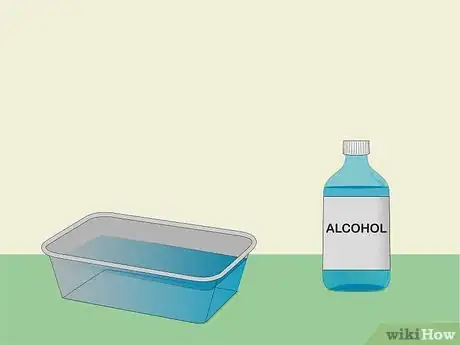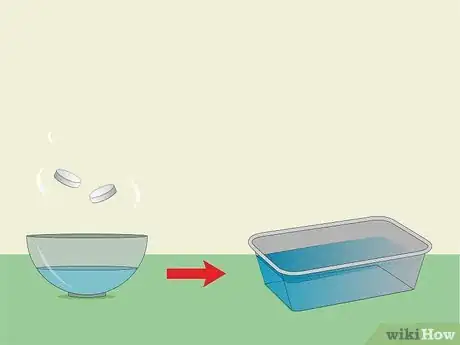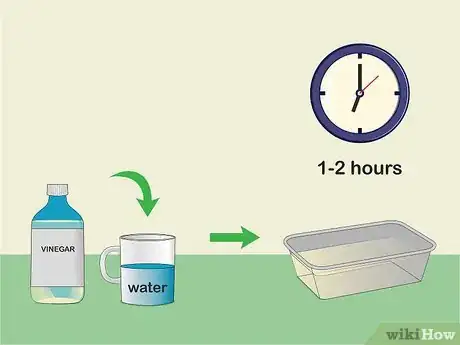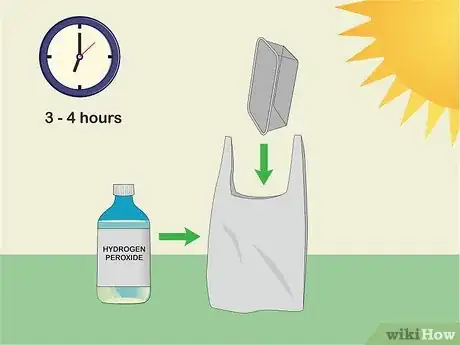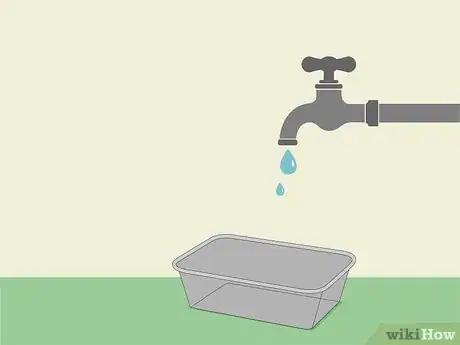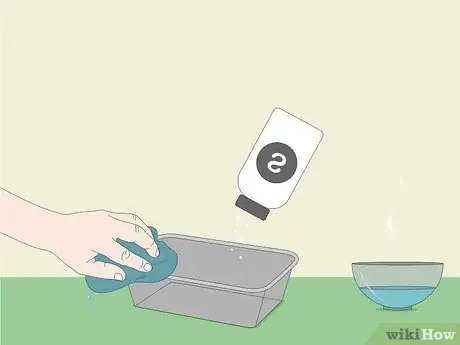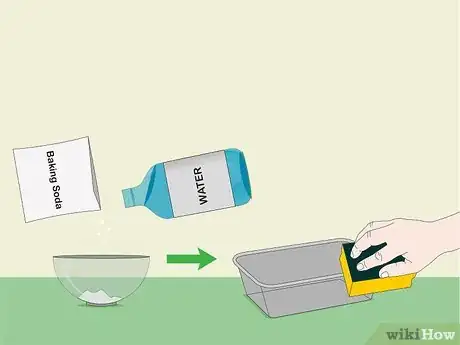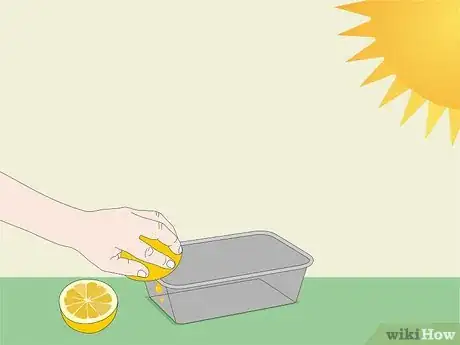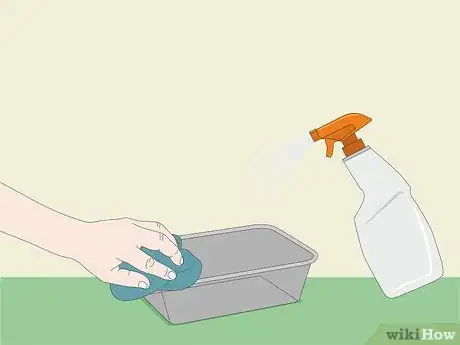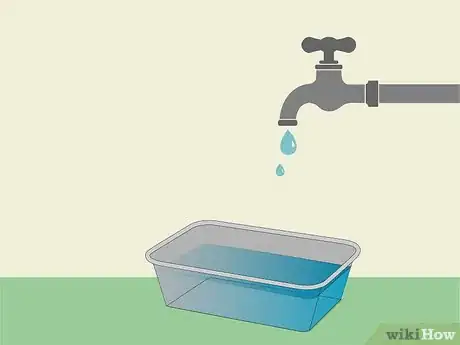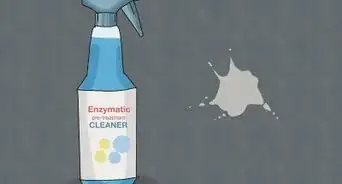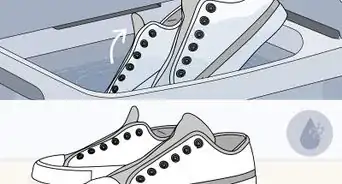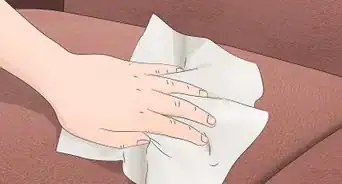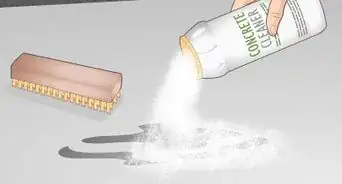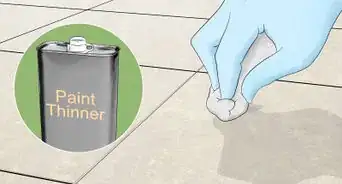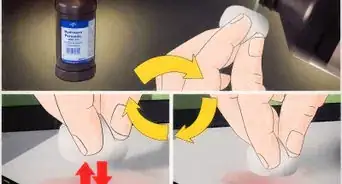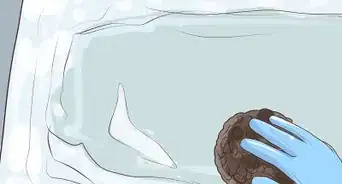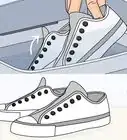This article was co-authored by Susan Stocker. Susan Stocker runs and owns Susan’s Green Cleaning, the #1 Green Cleaning Company in Seattle. She is well known in the region for outstanding customer service protocols — winning the 2017 Better Business Torch Award for Ethics & Integrity —and her energetic support of green cleaning practices.
This article has been viewed 235,452 times.
Whether they're from foods, sunlight, or chemical reactions, yellow stains often show up on plastic. There are many ways you can try to tackle these stains, such as soaking the plastic in bleach, rubbing alcohol, or hydrogen peroxide. If you would rather try scrubbing the stain instead of soaking it, try using lemon juice, salt, or a baking soda paste to remove the yellow stain.
Steps
Soaking the Plastic
-
1Cover the stains in rubbing alcohol to dissolve them. If the yellow stains are in a plastic container, you can pour rubbing alcohol into it and let the rubbing alcohol sit for a few minutes. If the piece of plastic can’t hold liquid, pour rubbing alcohol into another container and put the piece of plastic inside.[1]
- Rinse the piece of plastic with soap and water after pouring out the rubbing alcohol.
- If you don’t have rubbing alcohol, you can also use hand sanitizer the same way.
-
2Dissolve denture tablets in hot water to fix the discoloration. Purchase denture tablets at a drugstore or big box store and dissolve 2 tablets into hot water. Pour the mixture into or onto the stained plastic and let it sit until the stains are gone. Rinse the plastic off with soap and water.[2]
- You can also use alka seltzer as a substitute for denture tablets, as it will work similarly.
Advertisement -
3Try using bleach for a strong whitening product. Mix 1 tablespoon (15 ml) of bleach per 1 cup (240 ml) of water. Cover the plastic in the bleach solution and let it sit for 1-2 hours. Rinse the plastic with soap and water after you pour the bleach out.[3]
- Test the bleach out on a small section of the plastic before covering it entirely to make sure it doesn’t harm the plastic in any way.
EXPERT TIPSusan Stocker runs and owns Susan’s Green Cleaning, the #1 Green Cleaning Company in Seattle. She is well known in the region for outstanding customer service protocols — winning the 2017 Better Business Torch Award for Ethics & Integrity —and her energetic support of green cleaning practices.Cleaning Guru
 Susan Stocker
Susan Stocker
Cleaning GuruOur Expert Agrees: For really stubborn stains, mix equal parts water and bleach in the container and let it sit overnight. Rinse well, then let it sit outside in the sun for two full days. That will help with the smell of the bleach, and the sun will remove some of the stains.
-
4Use white vinegar if you’re concerned about using bleach. White vinegar works wonders on plastic similarly to bleach, without it being as harmful. Mix 1 part white vinegar with 1 part water before pouring the mixture into or onto your plastic. Let the plastic sit with the white vinegar for a couple of hours before rinsing it clean with soap and water.[4]
- If you’re trying to remove stains from a piece of plastic that can’t hold liquids, pour the white vinegar mixture into a container and then set the piece of plastic inside.
- The vinegar smell will disappear once the plastic is washed and left to dry.
-
5Coat the plastic in hydrogen peroxide to fix discoloration. Hydrogen peroxide works well on plastics that have turned entirely yellow instead of in just one spot. Fill a plastic bag with enough hydrogen peroxide to cover the plastic. Stick the plastic in the bag of hydrogen peroxide and lay it out in direct sunlight. Wait 3-4 hours before rinsing it off with clean water.[5]
- You can purchase hydrogen peroxide at a drugstore or big box store.
- If you’re treating some sort of plastic mechanism, make sure you remove all the parts that aren’t plastic before putting it into the hydrogen peroxide.
- You can also use an old toothbrush to scrub the hydrogen peroxide onto the plastic, if desired.
-
6Rinse the plastic thoroughly to remove the liquid. Once you've removed the stain with your chosen liquid, use clean running water to rinse the liquid off of the plastic. You can also use soap if desired.
- If the stain didn't come off, you can reapply the same liquid and follow the same process, or you can try out a different method to see if it works better.
Scrubbing the Stains
-
1Brush salt onto the stain using a damp cloth to help rub it away. Dampen a cloth or towel with warm water. Sprinkle salt all over the cloth, or pour the salt directly onto the plastic. Use the cloth to rub the salt into the plastic, helping to remove the stain. Keep rubbing until you see the stain disappear.[6]
- Rinse the plastic with clean water once you’re finished.
-
2Create a baking soda paste to use on the yellow stains. Pour some baking soda into a small cup or similar container. Add water slowly, mixing it with the baking soda until it forms a paste. You can apply the baking soda paste to the plastic before letting it sit on the plastic for a few hours. Use a sponge or paper towel to rub the paste onto the stain before rinsing it off.[7]
-
3Rub lemon juice onto the plastic to let the sun fix the stains. Cut a fresh lemon in half using a knife and then start rubbing the lemon over the plastic so that the juice covers the stains. Bring the plastic outside and let it sit in the sun for a few hours to an entire day. The sunlight should help remove the yellow stains.[8]
- Make sure you spread the lemon juice into the nooks and crannies of a stained piece of plastic, such as the yellowing marks on a cutting board.
-
4Test out store-bought products to see if one works well. Some cleaning products that you would buy at a big box or home improvement store will work on yellow stains. Look for products targeting the type of yellow stain your plastic has to see if a certain chemical product might work. Follow the directions, often using a paper towel or cloth to rub the product onto the stains.[9]
- A magic eraser can sometimes work on yellow stains, as do many cleaning powders.
-
5Wash the plastic thoroughly to remove the scrubbing materials. Use clean running water, and soap, if desired, to wash off the cleaning liquids and/or pastes. If the stain wasn't removed the first time, you can repeat the same process and scrub the plastic again.
Warnings
- Avoid using abrasive materials like steel wool or scouring pads when trying to remove stains, as they might cause scratches.⧼thumbs_response⧽
- Stains resulting from microwaving tomato-based foods in plasticware aren't likely to come out.⧼thumbs_response⧽
References
- ↑ https://foodal.com/knowledge/cleaning/11-ways-remove-stains-plastic/
- ↑ https://foodal.com/knowledge/cleaning/11-ways-remove-stains-plastic/
- ↑ https://www.familyhandyman.com/kitchen/countertops/how-to-remove-stains-from-plastic-laminate-countertops/view-all/
- ↑ http://www.momables.com/how-to-remove-stains-from-plastic-containers/
- ↑ http://www.retrofixes.com/2013/10/how-to-clean-whiten-yellowed-plastics.html
- ↑ https://foodal.com/knowledge/cleaning/11-ways-remove-stains-plastic/
- ↑ http://www.momables.com/how-to-remove-stains-from-plastic-containers/
- ↑ https://www.onegoodthingbyjillee.com/removing-stains-from-plastic-cutting-boards
- ↑ http://www.cookinglight.com/cooking-101/techniques/how-to-remove-turmeric-stains-on-plastic
About This Article
To remove yellow stains from plastic, try scrubbing it with common household items, like lemon juice, salt, or baking soda. If you decide to use lemon juice, cut a lemon in half and rub it on the affected area. Once the stain is covered in juice, take the item outside and let it sit in the sun for a few hours before rinsing it. For baking soda, make a paste by mixing it with water, then apply it to the stains. Let the plastic sit for a few hours before using a sponge or towel to rub the paste into the stain. After you've scrubbed the stain, rinse the paste off with warm water. In order to clean your plastic with salt, rub it into the stain with a damp cloth until the discoloration begins to fade. To learn how to clean plastic by soaking it in vinegar, keep reading!
